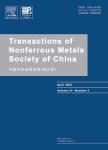Effect of Cu addition on microstructural evolution and hardening of mechanically alloyed Al-Ti-O in-situ composite
添加Cu对机械合金化Al-Ti-O原位复合材料显微组织演变和硬化的影响作者机构:Department of Physical Metallurgy of Non-Ferrous MetalsNational University of Science and Technology“MISiS”Leninskiy Prospect 4Moscow 119049Russia
出 版 物:《Transactions of Nonferrous Metals Society of China》 (中国有色金属学报(英文版))
年 卷 期:2020年第30卷第5期
页 面:1135-1147页
核心收录:
学科分类:08[工学] 0805[工学-材料科学与工程(可授工学、理学学位)] 080502[工学-材料学]
主 题:mechanical alloying Al-Ti-O system aluminum matrix composites microstructure hardening laser melting
摘 要:The microstructure formation and strengthening of an Al-5 wt.%TiO2 composites with additions of 5 wt.%Cu and 2 wt.% stearic acid(as a process control agent, PCA) during mechanical alloying and subsequent thermal exposure were studied. The powder composites were prepared by high-energy ball milling for up to 10 h. Single line tracks of the powders were laser melted. Optical and scanning electron microscopy, XRD analysis and differential scanning calorimetry were used to study microstructural evolution. The results showed that the Cu addition promotes an effective mechanical alloying of aluminum with Ti O2 from the start of milling, resulting in higher microhardness(up to HV 290), while the PCA, on the contrary, postpones this process. In both cases, the composite granules with uniform distribution of Ti O2 particles were formed. Subsequent heating of mechanically alloyed materials causes the activation of an exothermic reaction of Ti O2 reduction with aluminum, the start temperature of which, in the case of Cu addition,shifts to lower values, that is, the transformation begins in the solid state. Besides, the Cu-added material after laser melting demonstrates a more dispersed and uniform structure which positively affects its microhardness.



